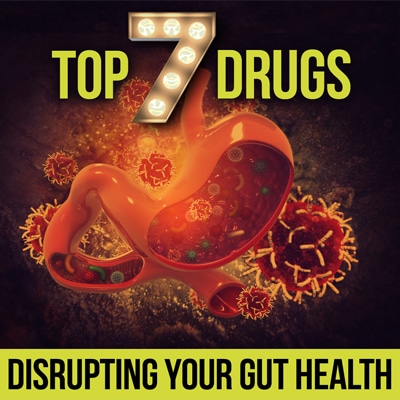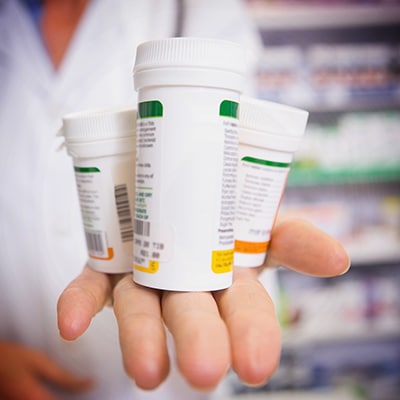Top 7 Drugs Disrupting Your Gut Health
When your doctor prescribes you a drug for an illness or a certain disease, do you ever wonder how it could be affecting your gut health?
Probably not.
When you’re prescribed drugs like antibiotics or steroids it doesn’t just affect your illness – it can also have a major impact on your gut microbiota.
This can lead to gut dysbiosis – an imbalance of your gut bacteria which can cause autoimmune diseases, neurological conditions, metabolic syndromes, and even certain cancers.
And surprisingly some of the most widely used drugs you’re using could be affecting your gut health.
Your Gut’s Thriving Ecosystem
The leading role in determining your gut health goes to – your gut bacteria. You have a whopping 100 trillion bacteria living in your gut which make up your gut microbiome.
While these little guys might be microscopic, in your gut they have a powerful hold on your overall health.
Your gut microbiota is known to affect essential functions in your body including:
- Digestion
- Energy metabolism
- Inflammation
- Mood
- Immune system
But certain environmental factors such as drugs can upset the health and balance of your gut bacteria.
This type of gut dysbiosis can directly or indirectly affect essential functions in your body leading to illnesses and disease.
The Top 7 Drugs Disrupting Your Gut Health
Although some of the following medications can be life-saving and life-altering drugs, they still have a major potential for upsetting your gut health.
If you can’t avoid taking these medications it’s important to understand the effect they have on your gut health.
The top 7 drugs disrupting your gut health include:
1. Antibiotics– Antibiotics shouldn’t come as a surprise that they affect your gut bacteria balance. Antibiotics are aimed to kill and interfere with the growth of pathogenic bacteria in your body.
Unfortunately, broad-range antibiotics also kill and stop the growth of good bacteria as well. Wiping out your gut bacteria – good and bad – taking antibiotics can leave you susceptible to the overgrowth of other unwanted microorganisms in your gut.
Studies show even just a short round of antibiotics it can have lasting effects on your gut health causing gut dysbiosis which can lead to a number of health concerns.
2. Proton Pump Inhibitors (PPIs) – Proton pump inhibitors such as Prilosec (omeprazole) are widely used to treat and prevent symptoms of gastroesophageal reflux disease (GERD). Antacids are aimed at reducing or eliminating the production of your stomach acid.
But this simple drug, which many Americans take on a daily basis, can affect the trillions of bacteria living in your gut.
Your stomach acid is used as a protective barrier to keep a balance of bacteria in your gut.
Once reduced or eliminated, your stomach acid is no longer a protective barrier which allows an increased risk of over-colonization of unwanted bacteria.
Studies show PPIs can promote small intestinal bacterial overgrowth, Clostridium difficile, and other enteric infections.
3. Nonsteroidal Anti-Inflammatory Drugs (NSAIDs) – We’ve all reached for that bottle of painkillers to help ease our back pain or a headache. But the side effects on your bottle of ibuprofen don’t warn you they may be bad for your gut health.
Ibuprofen and other NSAIDs can damage the lining of your gut and lead to gut inflammation. NSAIDs such as ibuprofen can cause intestinal permeability also known as “leaky gut” as well as gut dysbiosis, ulcers, and intestinal bleeding.
Common NSAIDs include:
- Aspirin
- Ibuprofen (Motrin or Advil)
- Celebrex
- Indomethacin
- Naproxen (Aleve)
- Diclofenac (Cambia, Zipsor, or Cataflam)
4. Anti-cancer drugs – Most people experience digestive issues during chemotherapy treatment. These harsh drugs are targeted to cancer cells which are constantly growing and dividing.
But they can also cause harm to the healthy cells which are actively growing and dividing in your body as well, such as those in your gastrointestinal tract.
Anti-cancer drugs have been shown to significantly affect your gut health by altering its composition during treatment.
This gut dysbiosis usually leads to common gastrointestinal issues in cancer patients such as constipation, diarrhea, and abdominal pain.
These studies have also shown that taking care of your gut health while taking these anti-cancer drugs with prebiotics can reduce these gastrointestinal symptoms.
5. Oral contraceptives – For all the women out there – your birth control pill could be causing mayhem in your gut. Birth control pills have been shown to cause malabsorption in the gut of essential vitamins and minerals in women.
Nutrient deficiencies while taking oral contraceptives may include:
- Zinc
- Magnesium
- Selenium
- Vitamin E, C, B6, B2, B12
- Folic acid
Studies show that taking oral contraceptive drugs can affect your gut health by increasing your risk for inflammatory bowel diseases such as Crohn’s disease and ulcerative colitis.
Birth control pills may also lead to Candida overgrowth.
With the extra estrogen in the pill, women become estrogen dominant which is the breeding ground for yeast. One study showed that risk for yeast infections double for those taking oral contraceptives.
6. Corticosteroid drugs – Long-term use of steroids drugs such as prednisone dosage and hydrocortisone for things like asthma and autoimmune diseases have been shown to affect your gut health.
Although these drugs are used to help suppress the immune system in autoimmune diseases, they can also hinder the health of your gut.
Chronic use of steroids may compromise the immune system – which is 80% located in your gut. When your immune system isn’t strong enough to fight off pathogenic bacteria this leaves you susceptible to many types of infections.
7. Antipsychotic drugs – Researchers have shown that antipsychotic generic drugs affect gut health by disrupting gut bacteria species. Gut dysbiosis in people taking atypical antipsychotic medications has been linked to metabolic syndromes.
The interaction of antipsychotic drugs on gut bacteria can lead to metabolic syndromes such as:
- Increased blood pressure
- Increased cholesterol
- Increased triglycerides
- Impaired glucose metabolism
- Increased weight gain
Metabolic syndromes increase the risk of diabetes by five times and cardiovascular diseases such as stroke and heart attack by two times.
Optimize Your Gut Health With Atrantil
Knowing which drugs affect your gut health doesn’t mean you need to take a giant leap and stop taking your chemotherapy drugs, antibiotics, or steroid medications.
But making yourself aware of how these drugs impact your whole body, especially your gut bacteria, can be powerful. It can help you make informed decisions on whether you should take antacids, antibiotics, NSAIDs, or oral contraceptives.
If you have to take these specific drugs, supporting your gut health with Atrantil can help inhibit the negative effects of these medications. Atrantil is a prebiotic which feeds your good bacteria to help them grow and thrive – fighting off any potential intruders.
Atrantil is packed with polyphenols which have antioxidant effects and help remove any harmful toxins lurking in your gut. Atrantil improves overall digestion and optimizes your gut health which can directly affect your overall health.


When starting maintenance of the gut with Atrantil when or if, should a probiotic be added?
Thank you for your question!
We recommend 2 capsules of Atrantil 3 times per day until symptoms have been relieved. Once symptoms have been relieved, we recommend reducing to the maintenance dose of 2-3 capsules every morning and at this point, it is ok to slowly add back in the probiotics. We hope this helps to clarify.
Please let us know if we can be of further assistance.
Thank you and best wishes,
Team Atrantil
Just wondering what affect an inhaled steroid has on the gut, specifically symbicort.
How can I get off Pantoprazole, and does Probiotic inter fer with Atrantil
Hi Jim,
Thank you for contacting us. We do not recommend taking probiotics while taking Atrantil. Atrantil works to get rid of the overgrowth of bacteria in the small bowel, which causes the adverse symptoms. By adding in more bacteria through probiotics, you are adding more fuel to the fire by putting more bacteria in the area we are trying to get rid of it.
However, once Atrantil has had a chance to work and the small bowel is able to flow freely again, so that the bacteria flow into the colon where they belong, you can add back in the probiotics. However, if you do choose to take probiotics while on Atrantil, just know it may take longer to see results. And in that case, we recommend spacing them at least an hour apart from the time you take Atrantil.
As for the Pantoprazole, unfortunately Atrantil is not a reflux medication, so we recommend talking to your health care provider to see what alternatives are best for you. Please let us know if we can be of further assistance.
Thank you and best wishes,
Team Atrantil
I’ve been taking Atrantil for about a week now hoping it would help my IBSD that I have almost every day after lunch. It has intensified since I’ve been taking it. I heard about “die off” but I’m wondering how long I should have to endure being fearful to eat lunch? Thanks for your help!
Hi Elizabeth,
Thank you for contacting us. A small percentage of people using Atrantil may experience temporary, cold/flu like symptoms such as; muscle ache/fatigue, runny nose, stomach ache/cramps, fatigue, nausea, etc. OR increased digestive symptoms such as diarrhea, constipation, or bloating after taking Atrantil.
This is generally not a reaction to Atrantil, but a reaction to the Archaeabacteria dying off and releasing endotoxins that behave as a mild irritant. Die-off should be seen as a positive sign, indicating that Atrantil is working, you have is the correct diagnosis, it will end soon and run its course, and that you are close to relief from your issues!
In most cases of Die-Off, it does not last longer than a few days to a week and taking one Aspirin or Ibuprofen should bring relief from these symptoms. Please let us know if you have any further questions. We are always happy to help!
Sincerely,
Team Atrantil
Can I take Atrantil and probiotics at the same time,have been advised to take probiotics by my health care provider.
Please let me know
After suffering for years with SIBO, I found Atrantil which changed my life. I’m very grateful for this miraculous product which I would recommend to anyone who is experiencing digestive issues.
Hi Wendy!
Thank you so much for your feedback and for being a valued customer. We are so happy you are feeling better with Atrantil!
Thank you and best wishes,
Support Team
What about tmau
Hi Robert,
Thank you for contacting us. We are happy to help you, but can you please be a little more specific with your question? Are you wanting to know something about trimethylaminuria?
Thank you and best wishes,
Support Team